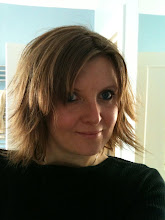Above: The window display of The White Stuff
"If a multinational company developed a nutritionally balanced and delicious food, a wonder drug that both prevented and treated disease, cost almost nothing to produce and could be delivered in quantities controlled by the consumers' needs, the very announcement of their find would send their shares rocketing to the top of the stock market. The scientists who developed the product would win prizes and the wealth and influence of everyone involved would increase dramatically. Women have been producing such a miraculous substance, breastmilk, since the beginning of human existence" - Gabrielle Palmer
Recently, whilst on a family day out, my son, who had been under the weather for a while, became restless and agitated. We were in a restaurant, waiting for our lunch to arrive. My son began fidgeting, getting more frustrated. He went from a smiley boy to a ball of frustration, his flaming red cheeks warning of an impending tantrum. He was really not happy.
And then he said "I want mummy milk".
I was worried. I do breastfeed him at home, normally when he wakes in the morning. However, since he's been below par, he has asked for a breastfeed more frequently. At home I will oblige. In public, I feel differently.
For a start, he is three years old. Some members of the public freak at a newborn being breastfed in public. How would I fare in a busy restaurant?
He also likes to chat a bit during the feed. Mostly about what the milk tastes like (interestingly, he can tell me what I've been eating - he caught me out with marshmallows, one day!). Ordinarily, I wouldn't be worried. In a restaurant where tables are shared by everyone, it's not quite considered polite chit-chat to have your breastfeeding child give a critique of the taste of his mother's milk, is it?
I was worried I would be accused of being "disgusting", or told that what I was doing is "wrong", or asked why I hadn't yet given up feeding him.
Or, worst of all, that I would be asked to leave (which, for the record, I wouldn't have).
Before long, my son was crying, and tugging at my top. I had to do something. So I took a deep breath, and then let him feed. The waitress who was serving us knew I was breastfeeding, but continued as normal. The couple sitting next to us glanced over a few times. The woman even smiled at me.
I felt elated! I did it! I breastfed my three year old in public, and nobody minded me doing it!
I felt elated! I did it! I breastfed my three year old in public, and nobody minded me doing it!
How utterly ridiculous that I felt this way, though.
I really struggle with this. Some members of my family don't understand why I breastfeed. I know they think I'm bonkers, extreme, neurotic; and they have found it bizarre that I would continue to do so. Until now, I haven't broadcast the fact to most people because I know they will think I'm strange.
But I'm not. Honest!
Breast milk is known for its immune-boosting properties in babies. But did you know that the presence of antibodies actually increase in milk in the second and third year and during the weaning process? The immune system doesn't mature until around the age of 6 years, so by breastfeeding for longer we are helping to boost and protect our little ones.
There are studies which show that babies who are breastfed have a higher IQ; are unwell less frequently; are less likely to develop allergies; and are less likely to be obese later in life; the mother has a reduced risk of developing osteoporosis or breast or ovarian cancer. Here is an interesting article which discusses the natural age of weaning
At the end of the feed, my son was calm, happy and relaxed. He no longer felt tense. He sat in his seat, sipping his drink and toying with the food on his plate, quietly chatting. No tantrum, no screaming, no fidgeting or restlessness. Magic!
My daughter rounded off the whole experience by saying, "Mum, you shouldn't worry about what others think. He loves his mummy milk, it makes him better!"
Out of the mouths of babes...
A wobbly image of me feeding my son in the restaurant. Not a particularly flattering photo!! :)











